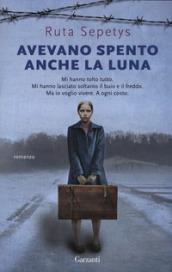
Avevano spento anche la luna
Avevano spento anche la luna: Lina ha appena compiuto quindici anni quando scopre che basta una notte, una sola, per cambiare il corso di tutta una vita. Quando arrivano quegli uomini e la costringono ad abbandonare tutto. E a ricordarle chi è, chi era, le rimangono soltanto una camicia da notte, qualche disegno e la sua innocenza. È il 14 giugno del 1941 quando la polizia sovietica irrompe con violenza in casa sua, in Lituania. Lina, figlia del rettore dell'università, è sulla lista nera, insieme alle famiglie di molti altri scrittori, professori, dottori. Sono colpevoli di un solo reato, quello di esistere. Verrà deportata. Insieme alla madre e al fratellino viene ammassata con centinaia di persone su un treno e inizia un viaggio senza ritorno tra le steppe russe. Settimane di fame e di sete. Fino all'arrivo in Siberia, in un campo di lavoro dove tutto è grigio, dove regna il buio, dove il freddo uccide, sussurrando. E dove non resta niente, se non la polvere della terra che i deportati sono costretti a scavare, giorno dopo giorno. Ma c'è qualcosa che non possono togliere a Lina. La sua dignità. La sua forza. La luce nei suoi occhi. E il suo coraggio. Quando non è costretta a lavorare, Lina disegna. Documenta tutto. Deve riuscire a far giungere i disegni al campo di prigionia del padre. E l'unico modo, se c'è, per salvarsi. Per gridare che sono ancora vivi. Lina has just turned fifteen when she discovers that one night is enough, only one, to change the course of a lifetime. When those men arrive, they force her to abandon everything. And to remember who he is, who he was, there's only one nightgown left, some design and his innocence. It is on June 14 of 1941 when the Soviet police violently burst into his house, in Lithuania. Lina, daughter of the rector of the university, is on the blacklist, along with the families of many other writers, professors, doctors. They are guilty of only one offense, that of existing. She'il be deported. Together with her mother and her little brother she is piled up with hundreds of people on a train and begins a journey with no return between the Russian steppes. Weeks of hunger and thirst. Until the arrival in Siberia, in a field of work where everything is gray, where the darkness reigns, where the cold kills, whispering. And where there is nothing left but the dust of the earth which the deportees are forced to dig, day after day. But there's something they can't take away from Lina. His dignity. His strength. The light in his eyes. And his courage. When she's not forced to work, Lina draws. Document everything. He must be able to get the drawings to the father's prison camp. And the only way, if there is, to save himself. To shout that they are still alive.
Prodotto fuori catalogo
Dettagli Libro
- Titolo: Avevano spento anche la luna
- Autore:
- Curatore:
- Traduttore:
- Illustratore:
- Editore: Garzanti
- Collana:
- Data di Pubblicazione:
- Pagine:
- Formato:
- ISBN: 9788811609315
- Non catalogati - Non catalogati






